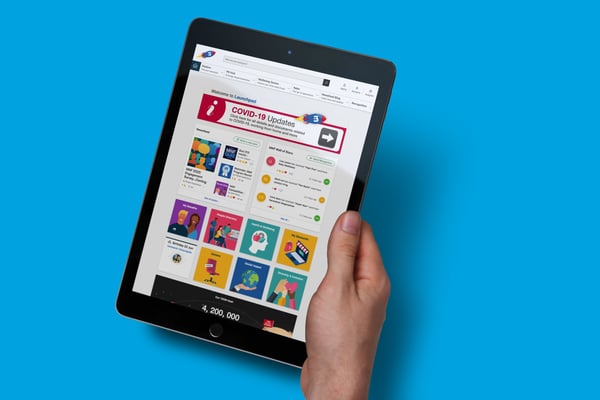The COVID-19 pandemic has greatly impacted businesses across the world over the last six months – with many companies shifting to remote work, and others trying to stay in touch with their essential workers and keep morale high at a stressful time, businesses have needed to adapt to meet their employees’ needs in this new work environment.
The crisis has also brought employee engagement into the spotlight, as it has become more important than ever for companies to find new ways to connect, recognise and support employees through this difficult time.
It’s important to understand the impact employee engagement can have on your entire business. Engaged employees will always be at the centre of every strong company – when employees’ needs are met, they will be happier, more productive and more engaged in the work they do for you every day.
As we're continuing to navigate and learn from the COVID-19 pandemic, some key themes have emerged, namely the importance of earning employees’ trust, improving employee wellbeing, enhancing company culture and strengthening employee engagement to prepare for the future. Here are some illuminating statistics relating to COVID-19 around how employees and employers around the world are handling the crisis:

The importance of employee-employer trust during challenging times
- Employees want regular updates from their employers on information relating to COVID-19, with 63% of respondents wanting daily updates and 20% wanting updates multiple times per day. (Edelman)
- While employees trust their employers slightly more now than prior to the pandemic, there’s still room for improvement – 59% of those surveyed said that they trust their organisation 'extremely' or 'very much' when it comes to decision-making. (Agility PR)
- Employers and managers also need to work on trusting their employees – 40% of managers and supervisors expressed doubt about their ability to manage workers remotely, and 38% said that employees perform worse when working remotely. (HBR)
- Employees trust their employer more than other sources for information on COVID-19 – with 'my employer' ranking 27 points higher than the government and media – so continue to update them and earn their trust. (Edelman)

Why it’s time to focus on wellbeing
- While employers might care about wellbeing, they aren’t necessarily taking steps to improve it – 48% of executives stated that employee wellbeing was a priority, but only 29% of HR leaders have a wellbeing strategy in place. (Mercer)
- 38% of employees in the UK have reported that the pandemic has negatively impacted their wellbeing (Deloitte) and 80% of UK employees say their mental health has declined. (Nuffield)
- Many employees have felt extreme financial stress during the pandemic, but only 37% believe that their companies can support them in a way that is considerate of their economic and personal situations. (Mercer)
- Some companies are checking the pulse of employee stress, as 68% of leaders reported that their employees’ anxiety levels have increased during the pandemic. (Willis Towers Watson)
Put company culture in the spotlight to boost employee morale
- Maintaining morale has been a challenge for leaders in the last few months, with 65% stating that it has been a problem. (SIA)
- Companies have had mixed results when it comes to maintaining culture and morale – one survey finds that 90% believe their culture has improved and 83% think that the work experience is better for employees. (Willis Towers Watson)
- On the other hand, another survey shows that over a third of employers have had challenges with culture and productivity throughout the pandemic. (Staffing Industry)

Remote work will continue to be the new normal after COVID-19
- Employees want to work from home after the crisis is over – 76% of global employees want to work from home part-time or more frequently after the pandemic (Global Workplace Analytics) and 86% of UK employees want to work remotely at least one day a week. (BM)
- Working from home will become the new normal after COVID-19, with one estimate predicting that 25-30% of employees will work remotely multiple days per week. (Global Workplace Analytics)
- Another prediction shows that up to 41% of employees will work from home at least part-time following the pandemic, compared to 30% prior to the pandemic. (Gartner)
- Now is the time to equip your employees with tools for the future – while 80% of employees and 92% of managers feel unprepared for the future of work, 60% of CEOs want to prioritise teaching employees necessary skills. (Gartner)
The pandemic has shown us how quickly the workplace can change. It’s hard to prepare for the unexpected, which is why it is essential to make the ways you connect, recognise and support your employees flexible and future-proof so that you can adapt when the unexpected happens. Not sure where to start? Get in touch with us, and we will show you how we can help your business through the pandemic and beyond.

%20(1).jpeg) Alexandra Powell
Alexandra Powell


